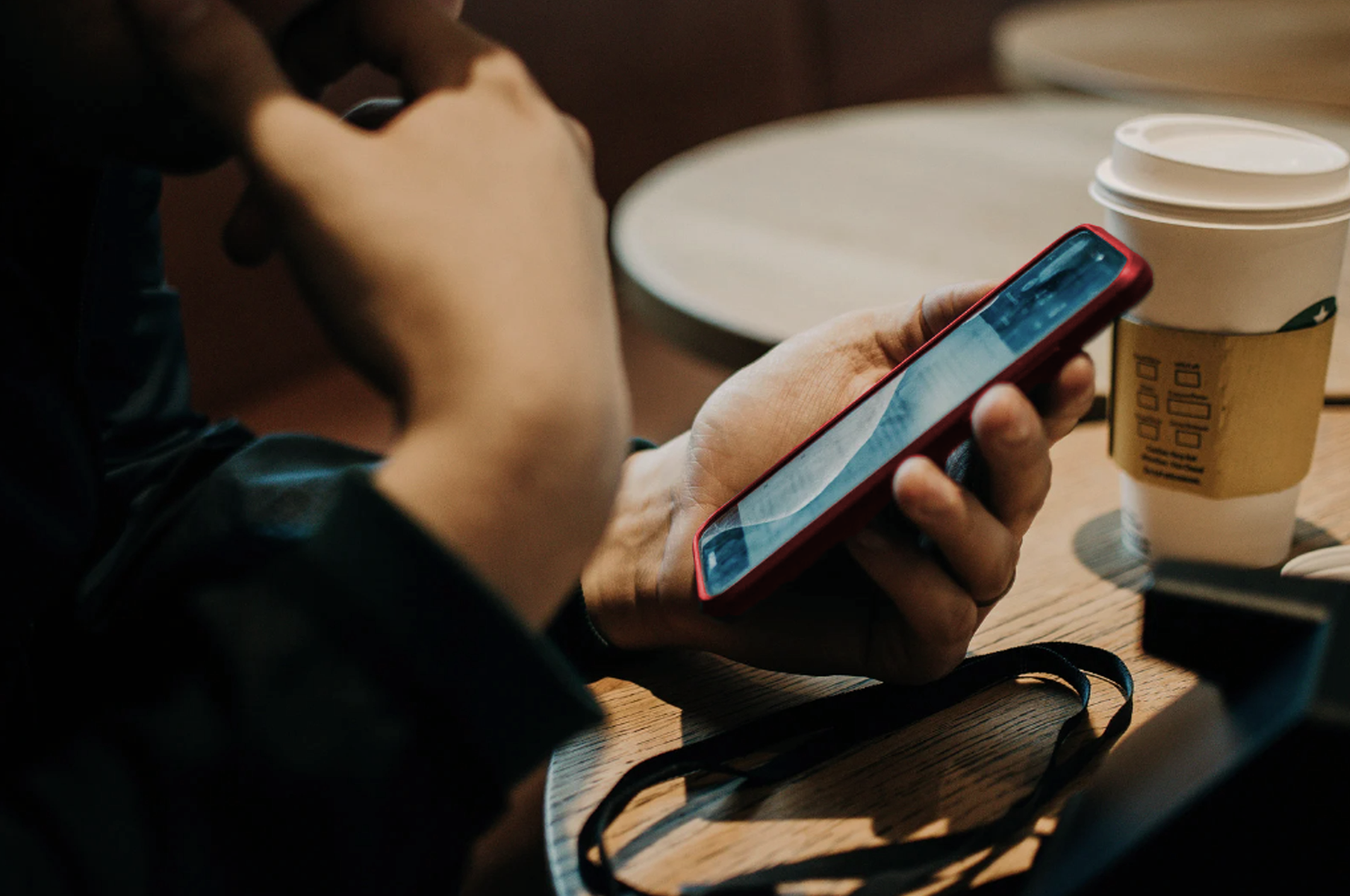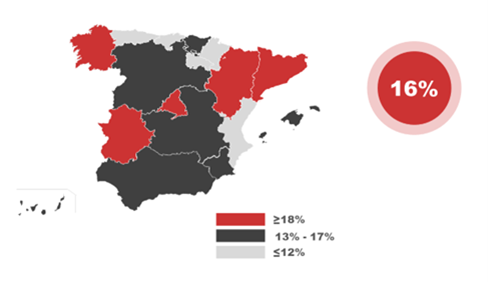'Oversharing: Addicted to Sharing Everything. Psychological Consequences of Social Media Addiction in Spain' Report

The dangers of oversharing: Social Media addiction is related to 55% of anxiety symptoms in Spain
- Oversharing, or the need to share aspects of our lives uncontrollably on social media, has very negative consequences on mental health. In Spain, addiction to these platforms is related to 55% of anxiety symptoms, 52% of depression symptoms, and 48% of aggressive behaviors towards others.
- We are glued to our smartphones: Spaniards spend an average of 6 hours a day on their mobile phones, and Generation Z (aged 16 to 30) exceeds 7 hours, of which 4 hours are spent on social media.
- Platform users behave like real influencers and show a perfect life: almost 4 out of 10 use filters to eliminate imperfections, and 64% of users only show happiness in their posts.
- People with less ability to manage their emotions become more addicted to social media. In fact, feeling nervous and aggressive towards someone are two emotions that influence 30% of the addiction to these platforms.
- Generation Z (aged 16 to 30), the most vulnerable group: they are more addicted, spend more hours a day on the platforms (exceeding 4 hours a day), resort to them more to alleviate their emotional problems (41%), and receive more offensive comments (55%).
- By Autonomous Communities, Extremadura (20%), Aragón, Comunidad de Madrid, Galicia, and Cataluña (19%) are the regions with the highest percentage of the population that frequently and very frequently post photos on their social networks. On the opposite side are Navarra (8%), Asturias (9%), and Comunidad Valenciana (10%).
Madrid, 10 December 2024. More and more young people are getting their first mobile phone and accessing social media at younger ages. In fact, some governments are starting to take action to even ban their use among preteens. The main reason: the addiction these platforms generate and the phenomenon of 'oversharing', or uncontrollably sharing aspects of private life online. In Spain, social media addiction is related to 55% of anxiety symptoms, 52% of depression symptoms, and 48% of aggressive behaviors towards others.
These are some of the main conclusions of the study 'Oversharing: Addicted to Sharing Everything. Psychological Consequences of Social Media Addiction in Spain', conducted by Línea Directa Health Insurance based on the results of 1,700 surveys carried out across Spain, measuring the actual phone and social media usage time of the respondents. Validated psychometric instruments used worldwide in the field of psychology and mental health were also employed.
This report was prepared in collaboration with Emotional Intelligence expert Ruth Castillo-Gualda and Anxiety and Stress Intervention specialist Juan Ramos-Cejudo, both professors at the Faculty of Health at Camilo José Cela University (UCJC), with the aim of thoroughly understanding the phenomenon of oversharing, how Spaniards behave on social media, how its use affects people's mental health, and proposing preventive advice to help users, from preadolescence, avoid becoming addicted to these platforms.
Oversharing in Spain
The growing dependence on social media as a tool for social validation and emotional connection drives many people to spend a lot of time sharing details of their personal lives seeking recognition and belonging. Specifically, we spend almost as much time sleeping as we do in front of screens because we are glued to our smartphones: Spaniards spend an average of 6 hours a day on their mobile phones, and Generation Z (aged 16 to 30) exceeds 7 hours, of which 4 hours are dedicated to social media.
Moreover, this addiction to being hooked all day leads users to share more information than usual, without being aware that this overexposure has negative consequences on their mental health. This has resulted in an overly detailed exposure of users' personal lives.
In fact, 6.5 million Spanish social media users admit to sharing intimate aspects of their lives, and 16% of the Spanish population claims to frequently or very frequently share photos on their social networks.
By Autonomous Communities, Extremadura (20%), Aragón, Comunidad de Madrid, Galicia, and Cataluña (19%) are the regions with the highest percentage of the population that frequently and very frequently post photos on their social networks. On the opposite side are Navarra (8%), Asturias (9%), and Comunidad Valenciana (10%).

How the misuse of social media affects emotional well-being
Intensive use of platforms is behind an increase in mental health problems. People who spend more time posting a perfect life online are those who face greater mental health issues. 55% of clinical anxiety symptoms, 52% of depression symptoms in Spain, and 48% of aggressive behaviors are related to social media addiction.
Another conclusion related to how social media use affects mental health is that those who fail to manage their emotions correctly are the most vulnerable to oversharing. In this sense, 30% of oversharing is related to the inability to regulate emotions. Additionally, people with less ability to manage their feelings become more addicted to social media. In fact, feeling nervous and aggressive towards someone are two emotions that influence 30% of the addiction to these platforms.
The report also reveals that screens are a harmful strategy, and people use social media as an ineffective strategy for managing emotions: Usage time influences 20% of anxiety, depression, and anger symptoms.
We behave like influencers and are slaves to perfection
The pressure to project an idealized image of life on these platforms also leads users to behave like real influencers. 51% have their profile public, and 2.7 million people have more than 2,000 followers. Additionally, people online present themselves as perfect and with an ideal life. Almost 4 out of 10 users use filters to eliminate imperfections, and 64% of people only show happiness in their posts, creating an idealized image of their lives. This behavior of showing only a part of our lives can negatively impact users' mental health as we tend to compare ourselves with others, generating frustrations that are sometimes difficult to channel.
Generation Z, a particularly vulnerable group
Young people are a vulnerable group when it comes to social media addiction and mental health. Generation Z spends, on average, more than 7 hours on their devices, and 1 in 4 spends more than 8 hours on smartphones. 42% of young people admit to having spent more time than planned on platforms like Instagram or TikTok.
In this context, Generation Z not only spends more time on screens but also shows greater addiction to platforms and presents more emotional symptoms, such as anxiety and depression, than other generations. Additionally, young people turn to social media more to alleviate their emotional health problems. 41% of Generation Z users (compared to 23% of the average) admit to having turned to them to alleviate feelings of guilt, anxiety, helplessness, or depression.
Finally, young people receive more offensive comments on platforms than the rest of the people online. 55% of younger users (compared to 30% on average) have received offensive comments on their posts at some point.
Tips to prevent social media addiction
It is important to raise awareness about healthy technology use and educate the population about the risks associated with digital addiction to establish healthy lifestyle habits from an early age.
In this sense, setting time limits for social media use, avoiding dependence from childhood by promoting responsible screen use, disabling notifications, or prioritizing direct contact over virtual friends are some preventive tips that should be put into practice from the moment preteens acquire their first device and social media profile.